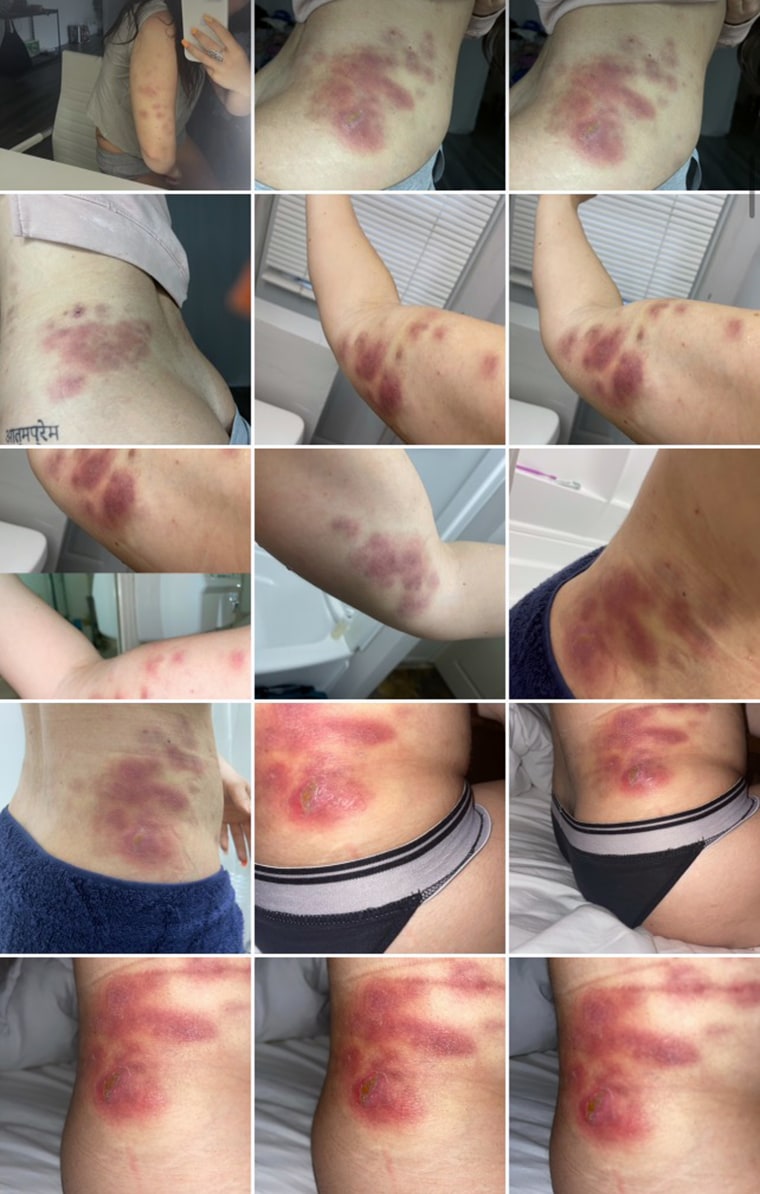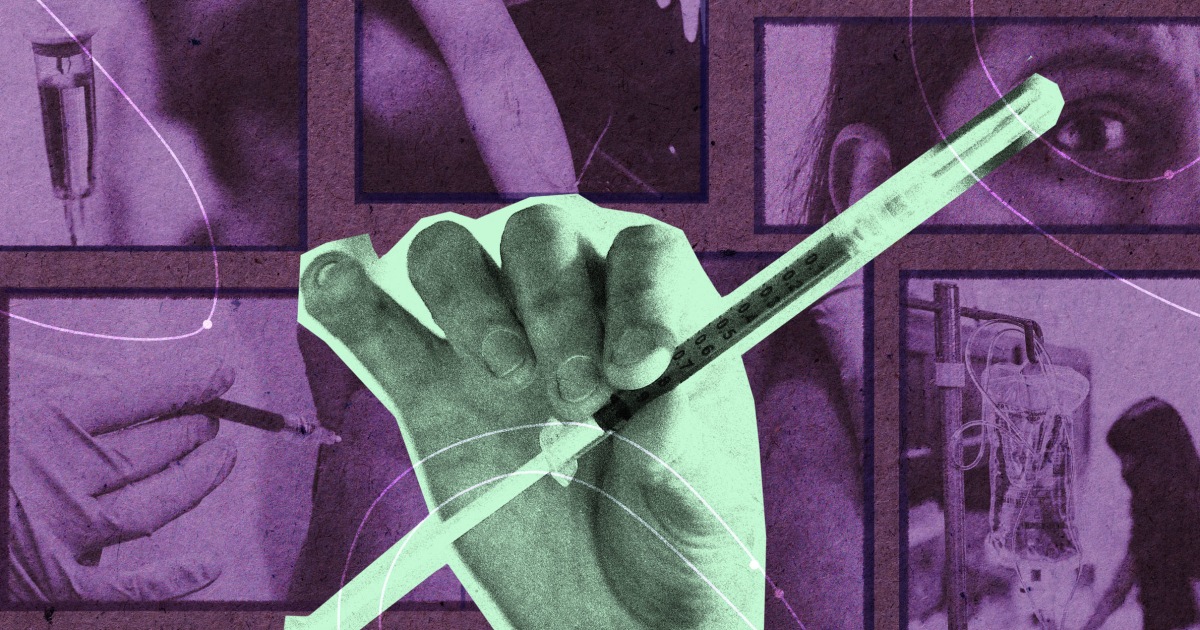[ad_1]
When Bea Amma visited a med spa in 2021, she was hoping for treatments that would boost her energy and help burn off some body fat. She never imagined she would end up with a drug-resistant infection that would leave her scarred and still recovering more than two years later.
Amma, then 24, had just moved to California with dreams of becoming a fitness and lifestyle influencer. She was keen to get an injection of vitamins B12 and C, as well as a compound called deoxycholic acid that was supposed to melt fat away.
“They told me that the more areas of my body they inject, the better,” Amma said. She said she was injected more than 100 times in her arms, stomach and lower back with the combination of vitamins and fat-melting ingredients.
Within 24 hours, Amma felt dizzy and feverish. Each injection site, she said, was painful and oozed with pus.
“Anything touching my skin was excruciating,” she said. “My entire body felt like it was on fire.”
The number of med spas and hydration clinics has ballooned in recent years, turning into a $15 billion wellness industry offering a variety of services, from IV therapy to skin care and cosmetic procedures. Federal health officials and representatives of med spa owners warn consumers that, along with the boom, some facilities are using unlicensed workers to inject unapproved products in unsanitary conditions.
It’s difficult to know how many people have been injured at med spas, because the infections often are not reported to local or state health departments. But some infectious disease and emergency room doctors say they are seeing more adverse reactions associated with the facilities.
Testing later found that Amma had been infected with an aggressive bacterium called Mycobacterium abscessus, which is found in water, soil and dust.

Courtesy Bea Amma
The bacterium is also often connected to cosmetic procedures that involve injections if the equipment is not sterilized properly, said Dr. Claire Brown, an infectious disease expert at UCLA.
The owner of the spa where Amma received her injections did not respond to a request for comment. The Los Angeles County Public Health Department investigated her case, but its results were “inconclusive.”
According to the Centers for Disease Control and Prevention, people “who receive injections without appropriate skin disinfection may be at risk for infection.”
Brown, who has been involved in Amma’s treatment, said her infection was so severe that she had to be hospitalized.
“The treatments are difficult, because there are not a lot of great choices to treat this class of bacteria,” Brown said. “She was getting worse and ultimately was on five antibiotics.”
Federal warnings about med spas
So-called wellness treatments like vitamin shots and hydrating intravenous infusion meant to cure hangovers promise a lot of medical benefits.
“It’s not to say, though, that any of those are actually medically proven to be true,” said Dr. Richina Bicette-McCain, an emergency medicine physician at Baylor College of Medicine.
The Food and Drug Administration warned last month about reports that consumers developed severe infections and skin deformities after they got unauthorized shots touted to dissolve fat at med spas across the country.
Those shots, which are unapproved, are sold online under the names Aqualyx, Lipodissolve, Lipo Lab and Kabelline, the FDA said.
“Some consumers received the injections at clinics or med spas by personnel who might not have been properly licensed to give the injections,” the FDA said in its warning.
The only approved product meant to break down fat under the skin is a drug called Kybella, which is typically injected underneath the chin to get rid of a double chin.
Bicette-McCain has treated a growing number of people with bad reactions after visits to med spas or hydration clinics.
“One of the most common complications that we see is infection, usually at the site of the IV placement,” she said. She has also cared for patients who have been burned by laser treatments or who need help following botched Botox injections.
“If the toxin is not injected properly, patients may come in with drooping eyebrows or eyelids that won’t open,” Bicette-McCain said. “There are a whole host of complications that we see.”
The FDA had warned that some med spas and IV clinics, including mobile IV infusion services, were mixing products inappropriately without proper sterilization. “Contaminated, or otherwise poor quality, compounded drug products can lead to serious patient illnesses, including death,” it said in 2021.
Little oversight at med spas
There are no federal health regulations or standard operating procedures for med spas, said Alex Thiersch, the chief executive of the American Med Spa Association. The facilities fall under the authority of each state, and all require doctors or other medical professionals on staff.
The rule is seldom enforced, Thiersch said.
“There are states who simply don’t have the resources or the time to be looking at the medical spas and ensuring that they’re doing things correctly,” he said.
The American Med Spa Association aims to fill the gap by providing legal and business resources to about 4,000 med spas across the U.S., working with them to ensure they are operating according to state laws.
While the vast majority are compliant and “very safe,” he said, the small number of spas that allow unauthorized procedures and employ unlicensed workers keeps him “up at night.”
“There is a bit of an underbelly to this industry, where you’ve got folks who should not be doing the treatment that they’re doing,” Thiersch said.
An ‘unlicensed individual’
On July 10, Jenifer Cleveland, 47, received an IV infusion at The Luxe Medspa by Amber Johnson in Wortham, Texas. It’s unclear what therapy she was there for that day; her family believes she had sought vitamin injections. Around 11:30 a.m., Cleveland said that she was having trouble breathing during the treatment and that her chest felt tight, according to attorneys for The Luxe Medspa.

Documents from the Texas Medical Board show that Cleveland passed out and was taken to a hospital, where she arrived at 12:17 p.m. Despite efforts to revive her with CPR, Cleveland was dead less than 10 minutes later. Doctors said she had suffered a cardiac arrest, which occurs when an irregular heart rhythm causes the heart to stop.
An autopsy, which was reviewed by NBC affiliate KCEN in Waco, Texas, could not determine that the IV therapy caused Cleveland’s death.
An investigation by the Texas Medical Board shows that the solution Cleveland received intravenously included total parenteral nutrition, or TPN, a potent, concentrated mix of electrolytes that doctors use to feed patients who are physically unable to consume adequate nutrition on their own.
Bicette-McCain, of Baylor College of Medicine, was “surprised” to hear any med spa would administer TPN, as it’s a mixture that must be carefully matched to each patient’s medical needs and almost always in hospital settings to avoid overdoses of electrolytes.
“It is very rare that a person needs TPN and also does not need to be under the care of a physician,” Bicette-McCain said.
No physician was present at The Luxe Medspa by Amber Johnson the day Cleveland died. According to lawyers representing Amber Johnson and The Luxe Medspa, “It is regretful that this incident happened, but there is simply no criminal liability that can or should be attributed to Amber Johnson.”
The Texas Medical Board suspended the establishment’s medical director’s license for a failure “to properly supervise an unlicensed individual performing intravenous treatments” that resulted in death.
Cleveland’s stepdaughter, Haley Hudson, said her family is devastated. “We just didn’t have words as a family. It was so sudden, so quick,” she said. She is calling for increased oversight of med spas to ensure safety. “Something’s got to change. Something’s got to give.”
Thiersch, of the American Med Spa Association, said it would “help tremendously” if there were nationwide standards of practice.
“This is a very safe industry,” Thiersch said. “But what’s missing is that baseline level of consistency across all states.”
Staying safe at med spas
Experts urge people to ask questions when they seek out treatments at med spas:
- Who owns and operates the med spa?
- Who is administering my treatment, and what credentials does that person have?
- Is a licensed medical practitioner on site in case there are complications?
“I know it’s uncomfortable to ask these questions,” Amma said. Looking back, she wishes she would have sought out the answers before she got the combination vitamin and fat-dissolving shots.
Nearly three years after her bacterial infection, Amma is left scarred, and she remains on intensive antibiotic treatment.
“Everything about my life has changed because of this,” she said. “Who knows if I’ll ever be cured?”
[ad_2]
Source link


